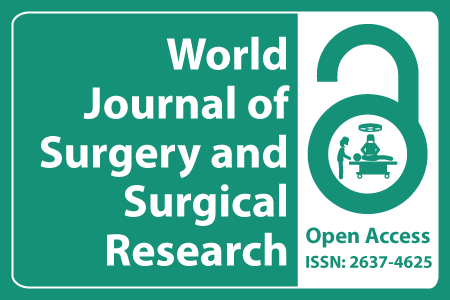
Journal Basic Info
- Impact Factor: 1.989**
- H-Index: 6
- ISSN: 2637-4625
- DOI: 10.25107/2637-4625
Major Scope
- Dental Surgery
- Plastic Surgery
- Surgical Oncology
- Ophthalmology
- Cardiovascular Surgery
- Podiatric Surgery
- Otolaryngology & ENT Surgery
- Vascular Surgery
Abstract
Citation: World J Surg Surg Res. 2019;2(1):1135.DOI: 10.25107/2637-4625.1135
The Effect of Laxative Use in Length of Hospital Stay and Complication Rate in Patients Undergoing Elective Colorectal Surgery within an ERAS Setting
Thalia Petropoulou, Evripidis Tokidis and Kassiani Theodoraki
General Surgeon, University of Athens, Greece
Sheffield Teaching Hospitals, University of Edinburgh, Edinburgh, UK
Department of Anesthesiology, University of Athens, Greece
*Correspondance to: Thalia Petropoulou
PDF Full Text Research Article | Open Access
Abstract:
Background: Enhanced Recovery after Surgery (ERAS) is a multimodal approach that aims to decrease the surgical tress and speed up the post-operative recovery. The use of laxatives is one of the ERAS elements which aim to reduce post-operative ileus and stimulate gut motility. With our study, we aim to evaluate if the addition of laxatives would make any difference in the Length of Hospital Stay (LoS) and in complications, among patients, within an ERAS setting, undergoing elective colorectal resections without stoma formation.
Materials and Methods: A prospectively collected database of 220 patients, undergoing elective colorectal resections between August 2015 and June 2017 was analyzed. The study population was divided in two groups. Both groups were within an ERAS setting, but in the first group (group A), we used laxatives from postoperative day 1. The second group (group B) did not use laxatives. Patients who required stoma formation or patients with a documented complication were excluded from the analysis for LoS, but all patients were included in the analysis for complications. Our primary goal was to evaluate the LoS in each group and secondary to evaluate the post-operative complications. Non-parametric tests were used. P Values <0.05 were considered to be statistically significant. The analysis was done for the overall LoS in each group and also separately for lap right hemicolectomies, lap left hemicolectomies and open or complicated resections.
Results: 220 patients were analyzed (100 patients in group A and 120 in group B). Patients demographics (age, sex, BMI), were similar between the groups. The overall median LOS was 4 days for group A (range 2 to 6) and 5 days for group B (2 to 7)) p<0.05). LoS was statistically significant less in all subgroup analyses. Sixteen patients had complications in group A (16%) and 22 in group B (18%, 3%), but this did not reach statistically significance (p=0.64).
Conclusion: Use of laxatives from day one post-operatively, could be a safe and effective measure to reduce LoS in patients undergoing uncomplicated elective colorectal surgery, without stoma formation.
Keywords:
ERAS; Length of stay; Laxatives; Prolonged post-operative ileus; Post-operative complications
Cite the Article:
Petropoulou T, Tokidis E, Theodoraki K. The Effect of Laxative Use in Length of Hospital Stay and Complication Rate in Patients Undergoing Elective Colorectal Surgery within an ERAS Setting. World J Surg Surgical Res. 2019; 2: 1135.













